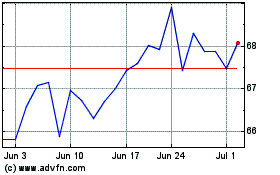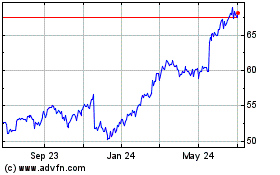Walmart Promises Raises for 425,000 Workers After Strong Holiday Sales -- Update
February 18 2021 - 9:06AM
Dow Jones News
By Sarah Nassauer
Walmart Inc. reported strong holiday sales and said it would
raise wages for about 425,000 of its employees after a year in
which the Covid-19 pandemic boosted its business.
U.S. comparable sales, or those from stores and digital channels
operating for at least 12 months, rose 8.6% in the quarter ended
Jan. 29, an acceleration from the third quarter, when sales climbed
6.4%, and higher than most analysts' forecasts. U.S. e-commerce
sales, which include online grocery orders, increased 69% from a
year earlier.
The country's largest private employer said it would raise pay
for U.S. workers to an average above $15 an hour. Its minimum
starting wage for U.S. workers will remain at $11 an hour.
The pay raises will be for store workers in digital and stocking
roles, said Walmart U.S. Chief Executive John Furner. That targets
roles that have been especially important during the pandemic,
including workers that gather products from store shelves for
online orders picked up in parking lots or delivered to homes.
Walmart has worked to keep shelves stocked as shoppers stockpile
certain items such as food and cleaning supplies.
"We saw major changes to customer behavior last year we believe
will be lasting, and we have to continue working to stay in-stock,
deliver items on time and provide the best omni experience
possible," said Mr. Furner.
Starting March 13, pay for workers in those roles will move up
to $13 to $19 an hour, based on a store's location.
Rivals Amazon.com Inc. and Target Corp. have made $15 an hour
their starting wage for all workers. The Biden administration and
Congress are considering raising the federal minimum wage from
$7.25 an hour.
Walmart CEO Doug McMillon has previously said the company
believes the federal minimum wage should go up, but that $15 was
too high for some regions and businesses.
Sales rose during the fourth quarter due to strong holiday
shopping, with an additional boost when U.S. stimulus checks
arrived in January, Walmart said. Food sales went up as the quarter
progressed, the company said.
Adjusted per-share earnings hit $1.39 during the quarter, lower
than the $1.51 analysts expected, according to FactSet. Walmart
spent around $1.1 billion in the quarter on Covid-19-related
expenses such as increased pay and benefits. The expense was
partially offset by reduced travel and professional service costs,
the company said.
Walmart said it expects lower profits and slower growth in the
new fiscal year. It forecast U.S. comparable sales would rise by a
low-single-digit percentage, compared with 8.6% growth in fiscal
2021. Walmart, like many other businesses during the pandemic, had
stopped giving financial guidance in recent quarters.
After surging last year, the company's stock fell 4.5% in
premarket trading Thursday.
Like recent quarters at Walmart, the number of shopper trips
declined but the average each spent per visit went up. Some
shoppers have avoided stores for health reasons, but are making the
most of each trip. During the most recent quarter, U.S. visits
declined 10.9%, while the average amount spent went up 21.9%.
Walmart, the country's largest retailer by revenue, has
generally fared well throughout the pandemic, rushing to fill
shelves when shoppers stockpiled early in the pandemic, then
benefiting as a drop in restaurant meals led more people to cook at
home and stock up on home goods and kids entertainment. Unlike many
retail competitors that were struggling before the pandemic hit,
Walmart had already invested heavily in e-commerce, including
online-order parking-lot pickup, a service that has grown in
popularity as more shoppers avoid stores for health reasons.
Walmart's total revenue reached a record $152.1 billion in the
fourth quarter, an increase of 10.3% from a year ago, and its
operating income increased 3% to $5.5 billion. The company reported
a quarterly net loss of $2.1 billion, reflecting hefty losses tied
to the pending sales of its U.K. and Japanese operations.
Retailers have reported mixed results over an unusual holiday
season that started early and relied heavily on e-commerce sales.
Amazon said quarterly sales jumped 44% to $125.6 billion, while
Target's comparable sales in November and December rose 17%
compared with last year.
Tapestry Inc., which owns the Coach and Kate Spade brands, said
sales fell over the holidays due to less store traffic, while
profits increased as it pulled back on discounts.
The Commerce Department reported that retail sales, which
includes spending at restaurants and online, jumped a seasonally
adjusted 5.3% in January from a month earlier. It was the strongest
gain since last June, when the economy was in the process of
reopening from pandemic-related closures.
Write to Sarah Nassauer at sarah.nassauer@wsj.com
(END) Dow Jones Newswires
February 18, 2021 08:51 ET (13:51 GMT)
Copyright (c) 2021 Dow Jones & Company, Inc.
Walmart (NYSE:WMT)
Historical Stock Chart
From Jun 2024 to Jul 2024

Walmart (NYSE:WMT)
Historical Stock Chart
From Jul 2023 to Jul 2024
